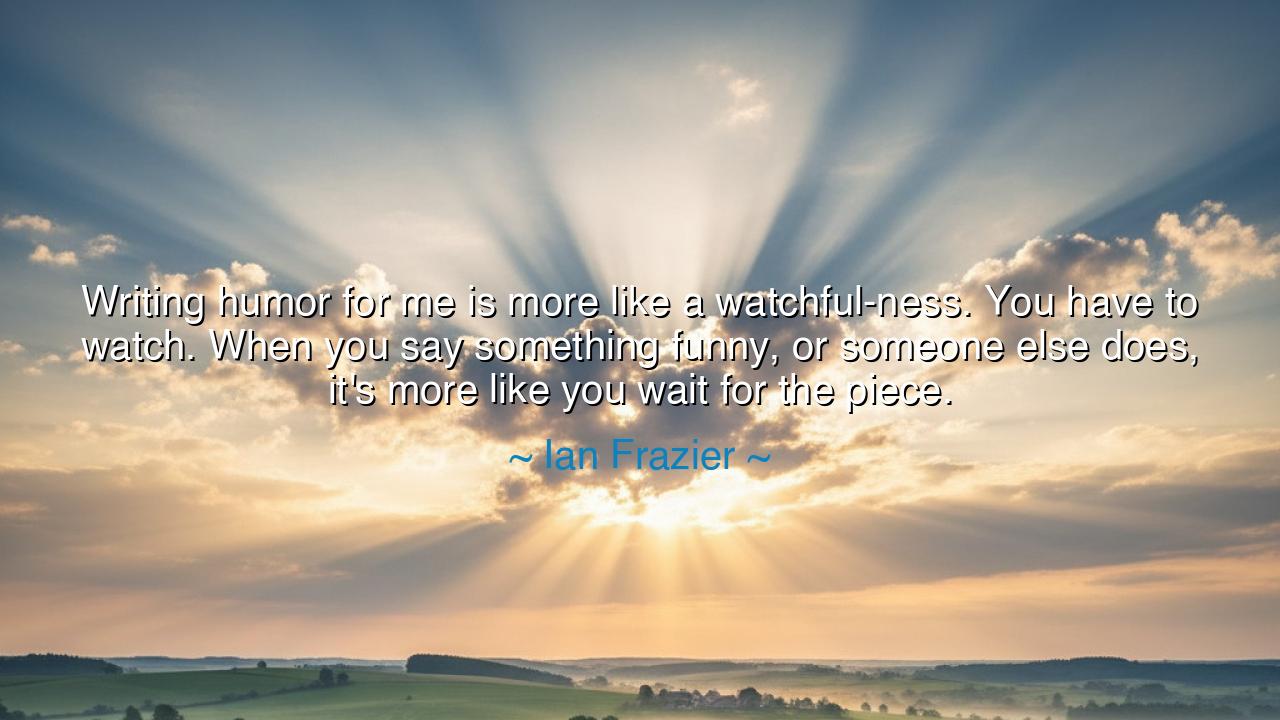
Writing humor for me is more like a watchful-ness. You have to
Writing humor for me is more like a watchful-ness. You have to watch. When you say something funny, or someone else does, it's more like you wait for the piece.






Hear the words of Ian Frazier, the quiet craftsman of laughter and truth: “Writing humor for me is more like a watchful-ness. You have to watch. When you say something funny, or someone else does, it’s more like you wait for the piece.” Within these humble words lies an ancient secret—the understanding that humor is not forged through effort or force, but discovered through awareness. Like the fisherman waiting in still waters or the monk listening for the wind in the trees, the humorist does not seize laughter—he listens for it, he waits until it comes of its own accord.
The ancients would have called this attentiveness, a discipline of spirit rather than craft. For true humor is not a weapon, nor a tool, but a revelation. It is born not from invention, but from observation—from seeing what others overlook, from noticing the absurdities that life conceals beneath its solemn mask. To be watchful, as Frazier teaches, is to be awake to the world’s contradictions: the mighty who act foolishly, the small joys hidden in sorrow, the tenderness within failure. The writer of humor, then, is not a jester painting laughter upon his audience, but a seer who reveals the hidden symmetry between tragedy and comedy, folly and wisdom.
Consider the example of Mark Twain, whose humor flowed not from invention alone, but from an almost divine patience. He did not rush to make men laugh; he watched—the riverboats, the preachers, the merchants, the fools—and from their living contradictions, he found the music of truth. When he wrote of human pride and human error, he did so with the gaze of one who had waited long enough to understand them both. His wit was never cruelty—it was clarity. Like Frazier, Twain understood that humor arises from recognition: the moment when one sees reality laid bare, ridiculous and beautiful all at once.
In truth, this watchful-ness is not limited to the making of art—it is the essence of wisdom itself. The philosopher Socrates was also a kind of humorist, for he wandered through Athens pretending ignorance, asking foolish questions that exposed the folly of the proud. His laughter was not mockery, but mercy—a way to draw men toward truth by showing them the comedy of their own self-deception. He waited, as Frazier says, for “the piece”—for that precise moment when life, through its own irony, revealed its deeper meaning. Thus, both the philosopher and the humorist share the same craft: to observe without judgment, to wait without impatience, and to speak only when the truth itself begins to laugh.
There is something deeply spiritual in this act of waiting. It requires humility, for the humorist must admit that he is not the master of laughter, only its servant. He must be quiet enough to hear when the universe chuckles, patient enough to see when the world slips upon its own contradictions. In this sense, humor becomes a practice of reverence—a way of aligning oneself with the hidden rhythms of existence. The laughter that follows is not an escape from truth, but a celebration of it, a recognition that even in chaos, there is grace.
Ian Frazier’s words remind us that the best humor is not loud or cruel, but mindful. It comes not from shouting, but from seeing. In our own lives, we too must learn this sacred watchful-ness—to observe before we speak, to listen before we judge, to wait before we act. For the world offers countless moments of quiet comedy: the stubborn pride of the clever, the sweet mistakes of the innocent, the absurd beauty of our daily striving. When we learn to notice these without bitterness, we discover that laughter and understanding are but two notes in the same song.
Let this, then, be the teaching passed to all who would live wisely: Be watchful. Be patient. Wait for the piece. In art, in speech, in life itself—do not rush to force meaning or laughter. Let it emerge in its own time, for what comes naturally carries the power of truth. When you find yourself amid the noise of the world, remember Frazier’s wisdom: the finest laughter is not crafted by the hand, but caught by the heart that watches. For the one who truly watches the world will find that the divine hides not in thunder, but in quiet smiles—and that even the smallest jest, when born from awareness, carries the light of eternity.






AAdministratorAdministrator
Welcome, honored guests. Please leave a comment, we will respond soon